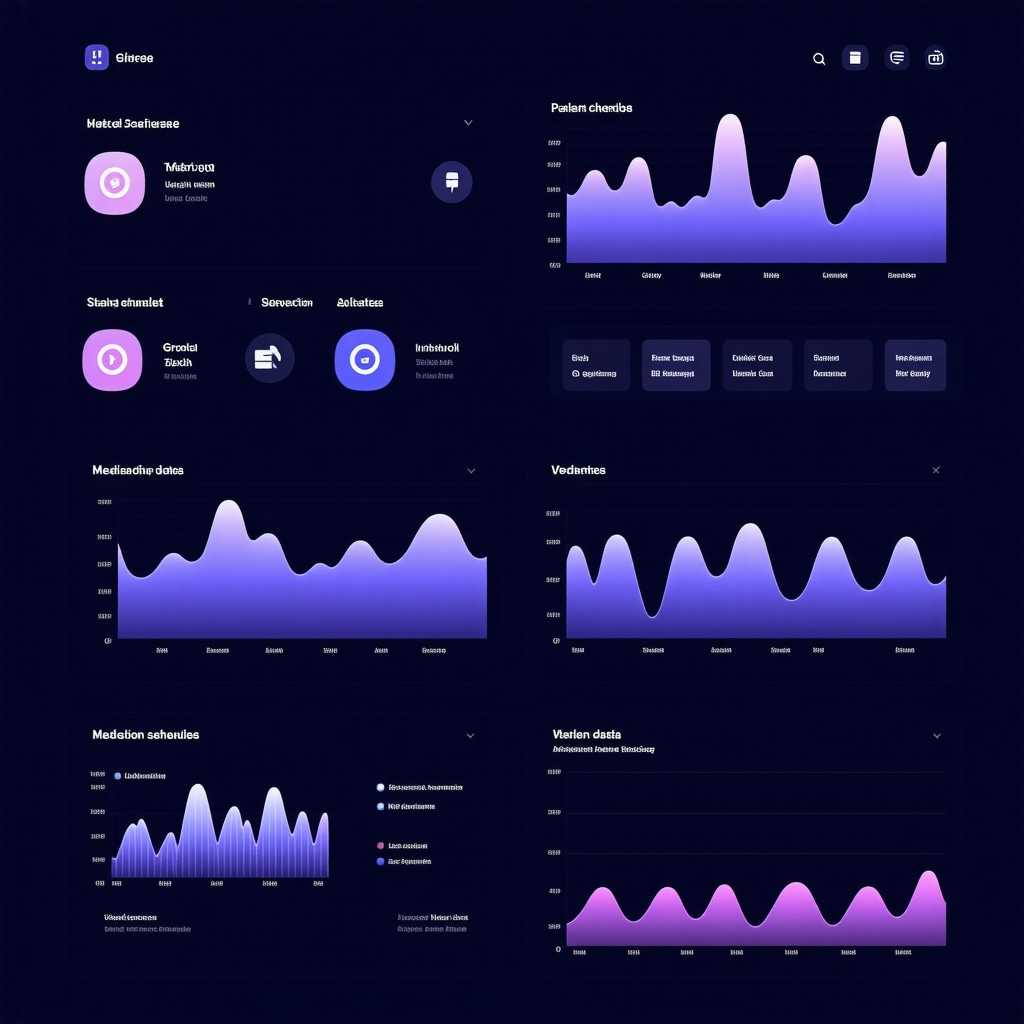Advanced Perspectives on FDA-Approved Prescription Pills for Weight Loss in 2025
In the evolving landscape of obesity management, prescription pills for weight loss represent a pivotal axis of medical intervention, combining pharmacological innovation with patient-centered therapeutic strategies. As of 2025, these medications have undergone rigorous FDA scrutiny, ensuring both efficacy and safety for patients struggling with obesity and related metabolic disorders. This article delves into the complex pharmacodynamics and clinical applications of the top FDA-approved weight loss medications, emphasizing their role within comprehensive medical weight loss programs.
Pharmacological Innovations Driving Weight Reduction: Beyond Conventional Approaches
The latest generation of prescription weight loss pills primarily leverages incretin mimetics, such as GLP-1 receptor agonists, which have transformed appetite regulation and energy homeostasis paradigms. Medications like semaglutide and tirzepatide not only modulate satiety centers in the hypothalamus but also improve insulin sensitivity, representing a dual-action approach to weight management and type 2 diabetes mitigation. These agents exemplify a shift from mono-target drugs to multifaceted metabolic modulators, reflecting cutting-edge endocrinological insights.
How Do GLP-1 Receptor Agonists Compare in Clinical Efficacy and Safety Profiles?
Clinical trials and meta-analyses reveal that semaglutide and tirzepatide induce superior weight loss outcomes compared to earlier pharmacotherapies, with mean reductions exceeding 15% of baseline body weight in many cases. However, their safety profiles require careful consideration; gastrointestinal adverse events are common, while rare but severe pancreatitis or thyroid C-cell tumors necessitate vigilant monitoring. The nuanced balance between therapeutic benefits and risks underscores the importance of individualized treatment planning under expert medical supervision.
Integrating Prescription Weight Loss Pills into Comprehensive Obesity Management
Optimal use of FDA-approved prescription pills involves integration with lifestyle interventions and behavioral therapies. Physicians tailor pharmacotherapy based on patient-specific parameters such as BMI, comorbidities, and prior treatment responses. Recent clinical guidelines advocate for physician-led fat loss plans that incorporate telemedicine to enhance accessibility and adherence, facilitating dynamic dose adjustments and side effect management. For an in-depth guide on personalized medical weight loss strategies, explore doctor-prescribed weight loss plans tailored medical solutions.
Emerging Questions from the Medical Community: What Are the Long-Term Implications of Continuous Use of Prescription Weight Loss Pills?
Long-term safety and sustainability of weight loss remain focal points of ongoing research and debate. Experts question the metabolic adaptations that may attenuate drug efficacy over time and the psychosocial impact of chronic pharmacotherapy. Additionally, the potential for weight regain post-discontinuation raises concerns about the need for durable lifestyle changes alongside medication. These complexities highlight the necessity for continuous patient education and longitudinal monitoring, as discussed in recent specialist forums.
Call to Action: Engage with Expert Medical Weight Loss Resources
For healthcare professionals and patients seeking authoritative, up-to-date insights on prescription weight loss medications and personalized treatment plans, visit doctor-led fat loss plans: a medical approach to obesity. Contribute your clinical experiences or patient stories to foster a collaborative knowledge base advancing the field.
Authoritative Reference: Wilding JPH, Batterham RL, Calanna S, et al. Once-Weekly Semaglutide in Adults with Overweight or Obesity. New England Journal of Medicine. 2021;384(11):989-1002. https://www.nejm.org/doi/full/10.1056/NEJMoa2032183
Addressing the Challenges of Long-Term Prescription Weight Loss Medication Use
While FDA-approved weight loss medications like semaglutide and tirzepatide demonstrate remarkable efficacy in short-term fat reduction, the question of sustainable management beyond initial success remains critical. Long-term use raises concerns regarding metabolic adaptation, potential diminishing returns, and patient adherence influenced by side effect profiles and lifestyle factors. Moreover, the psychological dynamics of dependence on pharmacotherapy versus empowerment through behavior change must be balanced to optimize outcomes.
Emerging data suggest that a multidisciplinary approach, incorporating continuous medical supervision, nutritional counseling, and psychological support, is essential for maintaining weight loss and preventing relapse. This approach aligns with the principles emphasized in doctor-prescribed weight loss plans for sustainable body transformation, which stress personalized care and adaptive treatment protocols.
The Role of Telemedicine in Enhancing Patient Engagement and Treatment Accessibility
Telemedicine platforms have revolutionized access to prescription weight loss medications, particularly in underserved or remote populations. By facilitating regular virtual consultations, dose titration, and side effect management, telemedicine enables tailored interventions that adapt to patient needs in real time. Additionally, digital health tools integrated into telemedicine services support behavioral modifications through reminders, self-monitoring, and motivational feedback.
Such innovations complement the clinical efficacy of injectable therapies by ensuring adherence and patient empowerment, a synergy explored in depth at convenient telemedicine weight loss treatment. The convergence of pharmacology and technology thus represents a promising frontier in obesity management.
How Can Clinicians Optimize Weight Loss Outcomes by Individualizing Medication Selection and Monitoring?
Individualization is paramount given the heterogeneity of obesity phenotypes and comorbid conditions. Clinicians must consider factors such as genetic predispositions, metabolic profiles, psychological status, and patient preferences when selecting FDA-approved weight loss medications. Comprehensive baseline assessments and ongoing monitoring for efficacy and adverse events enable dynamic adjustments, ensuring optimal therapeutic benefit.
Furthermore, integrating patient education on realistic expectations and potential side effects enhances engagement and adherence. This nuanced strategy is supported by evidence from the National Institutes of Health, highlighting the critical role of personalized medicine in weight management.
Exploring Combination Therapies: Are Multi-Modal Approaches the Future of Pharmacological Weight Loss?
Research increasingly investigates the synergistic potential of combining GLP-1 receptor agonists with other pharmacological agents targeting different metabolic pathways, such as SGLT2 inhibitors or amylin analogs. These combination therapies aim to enhance weight loss efficacy, improve glycemic control, and mitigate side effects through complementary mechanisms.
Although promising, such polypharmacy approaches necessitate rigorous clinical trials to establish safety, dosing protocols, and long-term outcomes. Until then, individualized monotherapy remains the standard, as outlined in expert guidelines.
Call to Action: Share Your Insights and Stay Informed on Cutting-Edge Weight Loss Therapies
We invite healthcare professionals and patients alike to engage with evolving knowledge on prescription weight loss treatments. Share your experiences or questions in the comments section to foster a collaborative, expert-driven community. For a comprehensive overview of safe and effective prescription options, visit prescription weight loss medications safe approaches to fat loss and explore tailored medical solutions to obesity.
Strategic Management of Chronic Use: Balancing Efficacy and Patient-Centered Care in Long-Term Prescription Weight Loss
As the paradigm shifts toward chronic management of obesity, understanding the subtleties of prolonged use of FDA-approved weight loss medications becomes imperative. The metabolic adaptations, including receptor downregulation and hormonal feedback loops, may attenuate pharmacological efficacy over extended periods. This phenomenon, often termed pharmacodynamic tolerance, necessitates vigilant clinical assessment to discern when dosage adjustments or therapeutic switches are warranted.
Patient adherence over the long haul is equally complex, influenced by side effect burden, psychological factors, and evolving lifestyle circumstances. Emotional support and motivational interviewing techniques integrated within multidisciplinary teams have shown promise in sustaining engagement and mitigating attrition. Moreover, the risk-benefit calculus must continuously evolve, with clinicians balancing the benefits of sustained weight reduction against potential adverse effects, including rare but serious events like pancreatitis or thyroid neoplasms.
What Are the Best Practices for Monitoring and Adjusting Long-Term Pharmacotherapy in Weight Management?
Experts recommend a comprehensive monitoring regimen encompassing metabolic panels, pancreatic enzyme levels, and thyroid function tests, alongside regular assessments of cardiovascular risk factors and mental health status. Dynamic dose titration guided by weight trajectory and tolerability ensures optimized outcomes. Patient education plays a pivotal role, empowering individuals to recognize early signs of adverse reactions and fostering shared decision-making.
Emerging clinical protocols advocate for scheduled medication holidays or combination with behavioral interventions to counteract physiological resistance, although robust evidence is still accruing. This nuanced approach aligns with findings published in the NIH’s comprehensive review on obesity pharmacotherapy, emphasizing personalized treatment paradigms.
Innovative Synergistic Therapies: Unlocking the Potential of Multi-Modal Pharmacological Combinations
Recent clinical trials highlight the promising horizon of combination pharmacotherapy, wherein agents with complementary mechanisms act in concert to magnify therapeutic benefits while minimizing adverse events. For example, pairing GLP-1 receptor agonists with SGLT2 inhibitors leverages enhanced glucose excretion and appetite suppression, delivering superior metabolic control and weight loss.
Similarly, the integration of amylin analogs modulates gastric emptying and satiety, potentially offsetting the gastrointestinal side effects commonly seen with GLP-1 receptor agonists. However, the complexity of pharmacokinetic interactions and cumulative side effect profiles requires meticulous dose optimization and patient selection.
Ongoing phase 3 trials are exploring triple combination regimens that target central and peripheral pathways, including neuropeptide Y antagonists and melanocortin receptor agonists. These multi-targeted approaches epitomize the frontier of personalized obesity pharmacotherapy.
Technological Advancements: The Role of Digital Health in Enhancing Precision Weight Loss Medicine
The integration of wearable devices, continuous glucose monitors, and AI-driven analytics is revolutionizing patient monitoring and personalized medication adjustments. Real-time data capture facilitates proactive management of side effects and adherence, while machine learning algorithms predict individual response patterns, enabling bespoke treatment trajectories.
Telemedicine platforms augment this ecosystem by providing seamless patient-provider interactions, fostering accountability and timely intervention. Digital therapeutics, combining cognitive behavioral therapy modules with pharmacotherapy, further enhance sustainable behavior change.
How Can Artificial Intelligence and Digital Tools Optimize Clinical Decision-Making in Prescription Weight Loss?
Artificial intelligence (AI) enables stratification of patients based on complex phenotypic and genotypic data, predicting drug responsiveness and adverse effect susceptibility with increasing accuracy. These insights assist clinicians in crafting personalized regimens that maximize efficacy and safety, reducing trial-and-error prescribing.
Moreover, AI-driven adherence monitoring through natural language processing of patient communications and sensor data informs timely support measures. As highlighted in a recent Nature Digital Medicine publication, this convergence of pharmacology and digital health heralds a new era in obesity management.

Ethical and Socioeconomic Dimensions: Ensuring Equitable Access to Advanced Weight Loss Medications
Despite clinical advancements, disparities in access to FDA-approved weight loss medications persist, driven by socioeconomic factors, insurance coverage limitations, and geographic barriers. Ethical considerations emphasize the imperative to democratize these therapies, integrating policy reform and patient advocacy to bridge the gap.
Programs leveraging telehealth outreach and subsidized medication schemes have demonstrated efficacy in expanding reach, yet systemic challenges remain. Incorporating social determinants of health into treatment planning enhances personalization and equity.
Future frameworks must embed equity as a foundational principle, aligning pharmacological innovation with social justice imperatives.
Call to Action: Deepen Your Expertise and Contribute to the Evolving Narrative of Medical Weight Loss
Healthcare professionals are encouraged to engage with multidisciplinary forums and continuing education platforms to stay abreast of emerging therapies and integrative management strategies. Patients and clinicians alike can benefit from collaborative knowledge sharing, fostering innovation and personalized care.
Explore detailed clinical guidelines and cutting-edge research at Expert Medical Weight Loss Research Hub and contribute your perspectives to this dynamic field.
Decoding the Synergistic Potential of Next-Generation Combination Pharmacotherapies
In the quest to transcend the limitations of monotherapy, emerging evidence highlights the promise of multi-modal pharmacological regimens that target diverse metabolic pathways simultaneously. Strategic combinations, such as GLP-1 receptor agonists with sodium-glucose cotransporter 2 (SGLT2) inhibitors or amylin analogs, exemplify this innovation, potentially amplifying weight reduction while attenuating adverse effects. These regimens leverage complementary mechanisms—appetite suppression, enhanced glycosuria, and delayed gastric emptying—to optimize metabolic outcomes and patient tolerability.
Integrating Artificial Intelligence Into Personalized Weight Loss Pharmacotherapy
The integration of artificial intelligence (AI) within obesity pharmacotherapy heralds a paradigm shift in precision medicine. Advanced machine learning algorithms synthesize multifactorial data — including genomics, phenotypic traits, and behavioral patterns — to predict individual drug responsiveness and side effect profiles. This enables clinicians to tailor medication selection and dosing with unprecedented specificity, thereby reducing the iterative trial-and-error typical of traditional weight loss regimens.
How Can AI-Driven Analytics Transform Long-Term Management of Obesity Pharmacotherapy?
AI-driven analytics facilitate dynamic adjustments by continuously monitoring patient adherence, metabolic markers, and psychosocial variables through wearable sensors and digital health platforms. This continuous feedback loop allows for preemptive intervention against pharmacodynamic tolerance and side effect escalation, potentially improving sustained efficacy. Moreover, predictive models can identify patients at risk for relapse or adverse events, informing personalized educational and motivational strategies.
Such innovations are substantiated by a Nature Digital Medicine article that emphasizes the transformative role of AI in optimizing obesity treatment pathways, underscoring the convergence of pharmacology and digital health as the frontier of modern obesity management.
Addressing Pharmacoeconomic and Ethical Imperatives in Advanced Weight Loss Treatments
As novel therapies emerge, equitable access remains a critical ethical and pharmacoeconomic challenge. Integrative strategies that combine policy advocacy, tiered insurance frameworks, and telehealth expansion are essential to mitigate disparities exacerbated by cost and geographic limitations. Embedding social determinants of health assessment into clinical decision-making ensures that advanced pharmacotherapies are accessible to diverse populations, aligning innovation with health equity.
Furthermore, transparent communication about long-term benefits, potential risks, and psychosocial impacts fosters informed consent and shared decision-making, critical components of ethical pharmacotherapy.
Call to Action: Advance Your Clinical Practice with AI-Enhanced, Combination-Based Weight Loss Strategies
Healthcare providers specializing in obesity management are encouraged to explore AI-enabled tools and emerging combination pharmacotherapies to elevate patient outcomes. Engage with interdisciplinary forums and continuous education platforms to integrate these sophisticated approaches into clinical workflows.
For comprehensive resources and collaborative opportunities, visit Expert Medical Weight Loss Research Hub and contribute your insights to this evolving landscape.

Expert Insights & Advanced Considerations
Strategic Integration of Pharmacotherapy with Behavioral and Technological Support
Evidence increasingly supports that prescription pills for weight loss yield optimal outcomes when combined with personalized behavioral interventions and digital health tools. This synergy enhances patient adherence, enables real-time monitoring of side effects, and allows dynamic dose adjustments. Clinicians should leverage telemedicine platforms to facilitate continuous engagement, thereby improving long-term sustainability of fat loss.
Metabolic Adaptations and the Necessity of Individualized Treatment Modifications
Long-term use of FDA-approved weight loss medications may induce pharmacodynamic tolerance, including receptor downregulation and hormonal feedback mechanisms, which can attenuate efficacy. A tailored approach involving periodic reassessment, potential medication holidays, or therapeutic switching is critical to maintain effectiveness and minimize adverse events.
Emerging Promise of Combination Pharmacotherapies Targeting Multiple Metabolic Pathways
Next-generation regimens combining GLP-1 receptor agonists with agents such as SGLT2 inhibitors or amylin analogs demonstrate enhanced metabolic control and weight loss through complementary mechanisms. While clinical trials are ongoing, these multi-modal approaches represent the forefront of advanced obesity pharmacotherapy, offering potential for superior efficacy and tolerability.
Artificial Intelligence as a Catalyst for Precision Weight Loss Medicine
AI-driven analytics integrate complex phenotypic, genotypic, and behavioral data to predict individual responses and optimize medication selection and dosing. This technology enables proactive management of adherence and side effects, ultimately refining long-term treatment trajectories and reducing trial-and-error prescribing.
Addressing Ethical and Socioeconomic Barriers to Equitable Access
Despite pharmacological advances, disparities in access to FDA-approved weight loss medications persist due to cost, insurance coverage, and geographic factors. Incorporating social determinants of health into clinical decision-making and expanding telehealth outreach are essential strategies to promote equity and democratize advanced obesity care.
Curated Expert Resources
New England Journal of Medicine (NEJM) on Semaglutide Clinical Trials: Offers comprehensive data on efficacy and safety of GLP-1 receptor agonists, essential for understanding their clinical utility. https://www.nejm.org/doi/full/10.1056/NEJMoa2032183
Nature Digital Medicine Article on AI in Obesity Management: Explores the transformative impact of artificial intelligence on personalized pharmacotherapy and adherence monitoring. https://www.nature.com/articles/s41746-020-0288-5
NIH Comprehensive Review on Obesity Pharmacotherapy: Provides detailed guidelines on monitoring, dose adjustments, and long-term management strategies for prescription weight loss drugs. https://www.ncbi.nlm.nih.gov/pmc/articles/PMC8427575/
Expert Medical Weight Loss Research Hub: A centralized resource offering the latest studies, clinical guidelines, and expert discussions on advanced weight loss treatments. Visit https://lossweight4all.com/expert-medical-weight-loss-research to deepen your expertise.
Doctor-Led Fat Loss Plans: A Medical Approach to Obesity: Explores tailored pharmacological and lifestyle interventions curated by specialists for effective, sustainable fat loss. Learn more at https://lossweight4all.com/doctor-led-fat-loss-plans-a-medical-approach-to-obesity.
Final Expert Perspective
In 2025, FDA-approved prescription pills for weight loss embody a sophisticated intersection of pharmacology, technology, and individualized patient care. Their efficacy is maximized not merely through medication choice but through integrative strategies that address metabolic, psychological, and socioeconomic dimensions. The advent of combination therapies and AI-enhanced precision medicine heralds a new era for sustainable obesity management, demanding clinicians remain agile and informed. To engage deeply with these advancing paradigms and contribute your professional insights, explore specialized resources such as the Expert Medical Weight Loss Research Hub or initiate personalized treatment discussions via direct expert consultation. Your active participation is vital to shaping the future of medical weight loss solutions.
